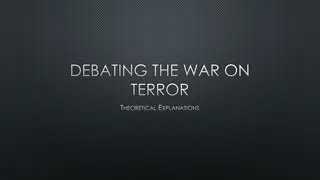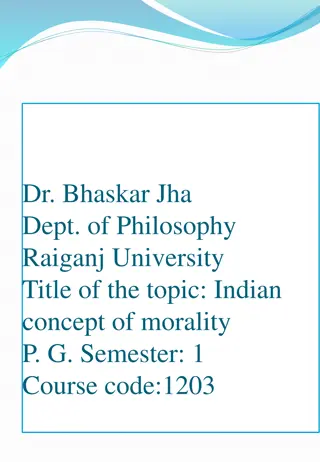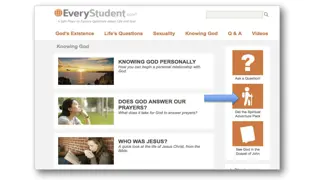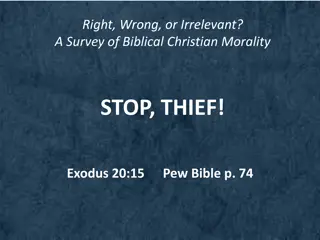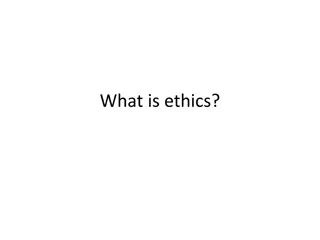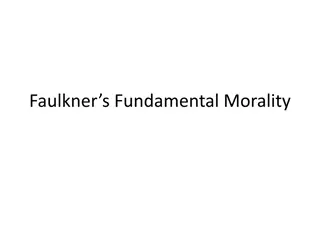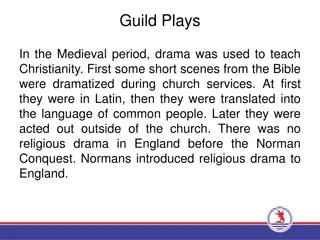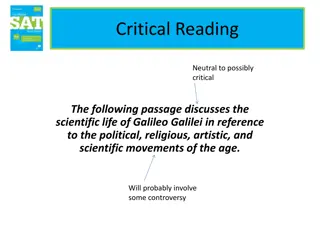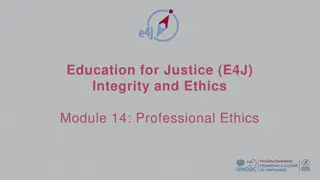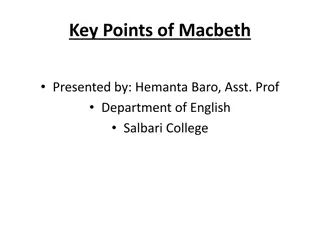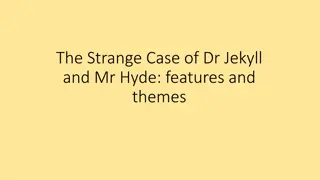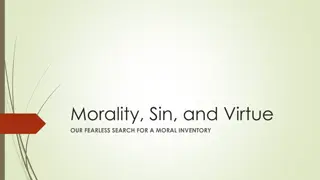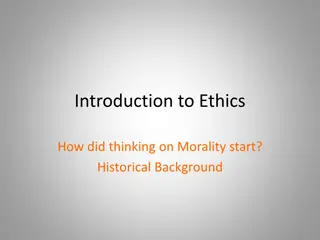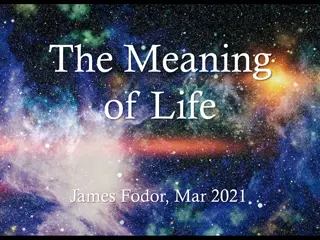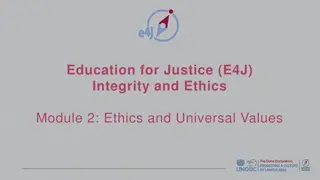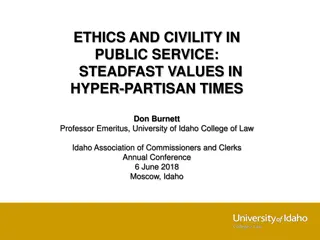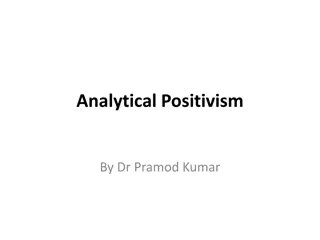Exploring the Clash Between New Atheism and Biblical Morality
The clash between New Atheists and biblical morality is highlighted in their differing views on ethics, justice, and religious teachings. Christopher Hitchens and Richard Dawkins express skepticism towards biblical moral codes, while advocating for a secular set of ethical principles. The debate encompasses interpretations of God's nature, moral obligations, and historical contexts such as the invasion of Canaan. Despite similarities in moral values, the disagreement underscores fundamental differences in perspectives on religion and morality.
Download Presentation

Please find below an Image/Link to download the presentation.
The content on the website is provided AS IS for your information and personal use only. It may not be sold, licensed, or shared on other websites without obtaining consent from the author. Download presentation by click this link. If you encounter any issues during the download, it is possible that the publisher has removed the file from their server.
E N D
Presentation Transcript
The Influence of Religion Ross Arnold, Fall 2015 Lakeside institute of Theology
Apologetics 2 (CM5) Oct. 2 Introduction Oct. 9 Faith and Reason Oct. 16 Mid-Term Break Oct. 23 Science and Origins Oct. 30 Science and Origins 2 Nov. 6 Morality, Suffering and Violence Nov. 13 The Influence of Religion Nov. 20 Conclusion; Final Exam
Christopher Hitchens consistently expressed his abhorrence of God, whom he referred to as a tyrant and a bully, always watching us apparently failing to notice that the God of Scripture as a God of compassion, mercy, justice, beauty, holiness, and love, who cares for his creation and for human beings, as well as a God of justice and judgment. Christians seldom realize that much of the moral consideration for others which is apparently promoted by both the Old and the New Testaments was originally intended to apply only to a narrowly defined in-group Love thy neighbor didn t mean what we now think it means. It meant only Love another Jew . Richard Dawkins
Dawkins New Ten Commandments (NTC). 1. Do not do to others what you would not want them to do to you. 2. In all things, strive to cause no harm. 3. Treat your fellow human beings, your fellow living things and the world in general with love, honesty, faithfulness and respect. 4. Do not overlook evil or shrink from administering justice, but always be ready to forgive wrongdoing freely admitted and honestly regretted. 5. Live life with a sense of joy and wonder. 6. Always seek to be learning something new. 7. Test all things; always check your ideas against the facts, and be ready to discard even a cherished belief if it does not conform to them. 8. Never seek to censor or cut yourself off from dissent; always respect the rights of others to disagree with you. 9. Form independent opinions on the basis of your own reason and experience: do not allow yourself to be led blindly by others. 10. Question everything.
Despite the fact that their new morality in many ways corresponds to biblical ethics, the New Atheists are very vocal in disapproving of biblical morality, particularly in the Old Testament most notably the command to invade Canaan. 1. The command to destroy the Canaanites is exceptional in the biblical record as a whole. 2. The invasion of Canaan is regarded as a judgment of God on the evils of these nations. 3. God had been patient with the tribes engaged in these evil practices for several centuries. 4. The invasion was not to be based on any assumed feeling of national moral superiority. 5. The nation of Israel was not to regard itself as God s favorites who could do no wrong.
The New Atheists imagine that a God of justice and judgment cannot also be a God of mercy, love, and compassion, failing to grasp that a God who did not judge Canaanite (or any other) evil would not be a God of mercy, love, & compassion. Justice and judgment are inseparable. Let the heavens be glad, and let the earth rejoice; let the sea roar, and all that fills it; let the field exult, and everything in it! Then shall all the trees of the forest sing for joy; before the Lord, for he comes, for he comes to judge the earth. He will judge the world in righteousness, and the peoples in his faithfulness.
If there is no judgment after death, then the vast majority of victims of injustice will never have their grievances put to rights, and many perpetrators of evil will get away with their crimes. Atheism has not got rid of suffering and the evil. Instead, their solution to the problem of evil (to deny the existence of God) has got rid of meaning and hope. Atheism is a hope-less faith, and so atheism makes evil & suffering much worse. But Christianity faces the problem of evil and offers hope that perfect justice will eventually be done, on the basis of the historical, bodily resurrection of Jesus Christ from the dead.
If death ends everything then the biblical worldview is false, there will be no ultimate justice for anyone, and any further discussion of the destruction of the Canaanites (or of anyone else, for that matter) is pointless. But if death is not the end, and there is to be a final and fair judgment, that is VERY different. A book on suffering which says nothing about heaven is leaving out almost the whole of one side of the account. Scripture and tradition habitually put the joys of heaven into the scale against the suffering of earth, and no solution of the problem of pain which does not do so can be called a Christian one. We are very shy nowadays of even mentioning heaven. We are afraid of the jeer about pie in the sky but either there is pie in the sky or there is not. If there is not, then Christianity is false, for this doctrine is woven into its whole fabric. If there is, then this truth, like any other, must be faced C.S. Lewis, The Problem of Pain
You know that I am a Christian. That means and I know it is difficult for you to follow me here that I believe that Yeshua is the messiah. I also believe that he was God incarnate, come into our world as savior, which is what his name Yeshua means. Now I know that this is even more difficult for you to accept. Nevertheless, just think about this question if Yeshua was really God, as I believe he was, what was God doing on a cross? Could it be that God begins just here to meet our heartbreaks, by demonstrating that he did not remain distant from our human suffering, but became part of it himself? For me, this is the beginning of hope; and it is a living hope that cannot be smashed by the enemy of death. The story does not end in the darkness of the cross. Yeshua conquered death. He rose from the dead; and one day, as the final judge, he will assess everything in absolute fairness, righteousness, and mercy. There are no simplistic answers to the hard questions thrown up by human suffering. The answer that Christianity gives is not a set of propositions or a philosophical analysis of the possibilities it is, rather, a Person who suffered.
New Atheism, however, finds the concept of the atonement of Christ reprehensible Richard Dawkins, while recognizing the atonement is the central doctrine of Christianity, regards it as vicious, sadomasochistic and repellent. Ask yourself the question: how moral is the following? I am told of a human sacrifice that took place two thousand years ago, without my wishing it and in circumstances so ghastly that, had I been present and in possession of any influence, I would have been duty-bound to try and stop it. In consequence of this murder, my own manifold sins are forgiven me, and I may hope to enjoy eternal life. Christopher Hitchens the Pauline obscenity of every baby being born in sin, saved only by the divine scapegoat suffering on the cross because the Creator of the universe couldn t think of a better way to forgive everybody. Richard Dawkins


